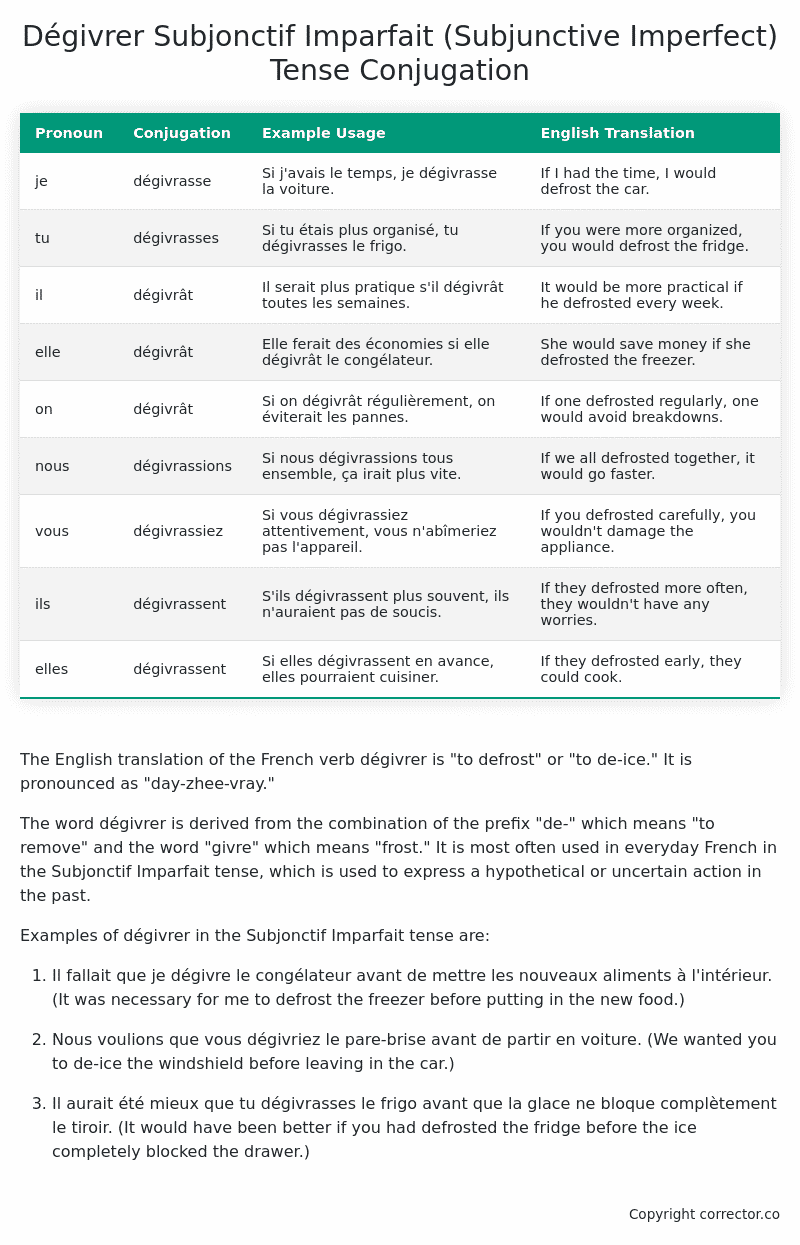Subjonctif Imparfait (Subjunctive Imperfect) Tense Conjugation of the French Verb dégivrer
Introduction to the verb dégivrer
The English translation of the French verb dégivrer is “to defrost” or “to de-ice.” It is pronounced as “day-zhee-vray.”
The word dégivrer is derived from the combination of the prefix “de-” which means “to remove” and the word “givre” which means “frost.” It is most often used in everyday French in the Subjonctif Imparfait tense, which is used to express a hypothetical or uncertain action in the past.
Examples of dégivrer in the Subjonctif Imparfait tense are:
-
Il fallait que je dégivre le congélateur avant de mettre les nouveaux aliments à l’intérieur. (It was necessary for me to defrost the freezer before putting in the new food.)
-
Nous voulions que vous dégivriez le pare-brise avant de partir en voiture. (We wanted you to de-ice the windshield before leaving in the car.)
-
Il aurait été mieux que tu dégivrasses le frigo avant que la glace ne bloque complètement le tiroir. (It would have been better if you had defrosted the fridge before the ice completely blocked the drawer.)
Table of the Subjonctif Imparfait (Subjunctive Imperfect) Tense Conjugation of dégivrer
| Pronoun | Conjugation | Example Usage | English Translation |
|---|---|---|---|
| je | dégivrasse | Si j’avais le temps, je dégivrasse la voiture. | If I had the time, I would defrost the car. |
| tu | dégivrasses | Si tu étais plus organisé, tu dégivrasses le frigo. | If you were more organized, you would defrost the fridge. |
| il | dégivrât | Il serait plus pratique s’il dégivrât toutes les semaines. | It would be more practical if he defrosted every week. |
| elle | dégivrât | Elle ferait des économies si elle dégivrât le congélateur. | She would save money if she defrosted the freezer. |
| on | dégivrât | Si on dégivrât régulièrement, on éviterait les pannes. | If one defrosted regularly, one would avoid breakdowns. |
| nous | dégivrassions | Si nous dégivrassions tous ensemble, ça irait plus vite. | If we all defrosted together, it would go faster. |
| vous | dégivrassiez | Si vous dégivrassiez attentivement, vous n’abîmeriez pas l’appareil. | If you defrosted carefully, you wouldn’t damage the appliance. |
| ils | dégivrassent | S’ils dégivrassent plus souvent, ils n’auraient pas de soucis. | If they defrosted more often, they wouldn’t have any worries. |
| elles | dégivrassent | Si elles dégivrassent en avance, elles pourraient cuisiner. | If they defrosted early, they could cook. |
Other Conjugations for Dégivrer.
Le Present (Present Tense) Conjugation of the French Verb dégivrer
Imparfait (Imperfect) Tense Conjugation of the French Verb dégivrer
Passé Simple (Simple Past) Tense Conjugation of the French Verb dégivrer
Passé Composé (Present Perfect) Tense Conjugation of the French Verb dégivrer
Futur Simple (Simple Future) Tense Conjugation of the French Verb dégivrer
Futur Proche (Near Future) Tense Conjugation of the French Verb dégivrer
Plus-que-parfait (Pluperfect) Tense Conjugation of the French Verb dégivrer
Passé Antérieur (Past Anterior) Tense Conjugation of the French Verb dégivrer
Futur Antérieur (Future Anterior) Tense Conjugation of the French Verb dégivrer
Subjonctif Présent (Subjunctive Present) Tense Conjugation of the French Verb dégivrer
Subjonctif Passé (Subjunctive Past) Tense Conjugation of the French Verb dégivrer
Subjonctif Imparfait (Subjunctive Imperfect) Tense Conjugation of the French Verb dégivrer (this article)
Subjonctif Plus-que-parfait (Subjunctive Pluperfect) Tense Conjugation of the French Verb dégivrer
Conditionnel Présent (Conditional Present) Tense Conjugation of the French Verb dégivrer
Conditionnel Passé (Conditional Past) Tense Conjugation of the French Verb dégivrer
L’impératif Présent (Imperative Present) Tense Conjugation of the French Verb dégivrer
L’infinitif Présent (Infinitive Present) Tense Conjugation of the French Verb dégivrer
Struggling with French verbs or the language in general? Why not use our free French Grammar Checker – no registration required!
Get a FREE Download Study Sheet of this Conjugation 🔥
Simply right click the image below, click “save image” and get your free reference for the dégivrer Subjonctif Imparfait tense conjugation!

Dégivrer – About the French Subjonctif Imparfait (Subjunctive Imperfect) Tense
Formation
Common Everyday Usage Patterns
Interactions with Other Tenses
Subjonctif Présent
Indicatif Passé Composé
Conditional
Conditional Perfect
Summary
I hope you enjoyed this article on the verb dégivrer. Still in a learning mood? Check out another TOTALLY random French verb conjugation!


